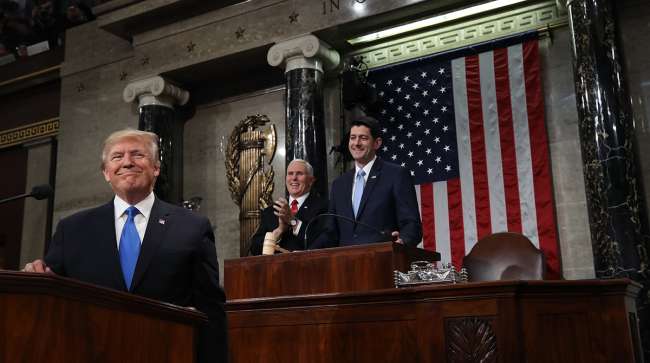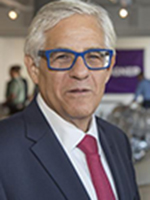Senior Reporter
Transportation Stakeholders Curious About Trump Infrastructure Package

Much of the transportation community — freight and business executives, the construction sector, local leaders and experts — said President Donald Trump’s call for a $1.5 trillion infrastructure bill that also would streamline project permitting to two years during his State of the Union address left them with more questions than answers, particularly on the matter of funding.
They agree Trump’s topline request is not deemed as sufficient to cover costs to repair the country’s transportation network, which includes more than 54,000 structurally deficient bridges.
Trump’s plan, White House officials say, is expected to consist of $200 billion in direct federal funding to incentivize private-sector investments capable of achieving the $1.5 trillion mark.

Moss
“The transportation priorities that were laid out, which is that funding has to be shared by state and localities, private sector have a role in this — all of these are good but I don’t know that this is [a] sufficient amount of money to do the job the nation needs,” said Mitchell Moss, director of Rudin Center for Transportation Policy & Management, calling the amount “quite modest” over a decade. The center is at New York University’s Robert F. Wagner Graduate School of Public Service.
Marcia Hale of infrastructure advocacy group Building America’s Future acknowledged the important role private investors could play in certain big-ticket projects. However, the White House and Republican leadership in control of Congress must dedicate federal funds for the system to guarantee projects get built.
“Eventually we have to come up with some money to do this,” Hale said. “And we have to not only maintain our 65-year-old highway system, but we have to start building it for the future.”

Robinson
Jeff Robinson, U.S. Public Interest Research Group’s senior director of transportation, is calling on the White House to prioritize funding for projects focused on reducing growth in vehicle-miles traveled. Doing so, would “account for the public health, environmental and climate benefits as well as the reduced need to increase road capacity in the future,” Robinson said.
Traditional infrastructure stakeholders say they are looking to Congress to legislate on whatever guiding principles the White House offers about its infrastructure plan sometime in mid-February.
These groups — such as American Trucking Associations, the U.S. Chamber of Commerce, roadbuilders, state transportation officials and engineers — are aligned in pushing for an increase in federal fuel taxes (currently 24.4 cents per gallon for diesel, and 18.4 cents for gasoline) to boost the federal Highway Trust Fund.
“If scientists can clone monkeys, Congress ought to be able to figure out how to raise federal dollars to fix the Highway Trust Fund and modernize our choking national freight network,” said Pete Ruane, president of the American Road and Transportation Builders Association.
We have to not only maintain our 65-year-old highway system, but we have to start building it for the future.
Marcia Hale
The American Society of Civil Engineers last year gave the country’s infrastructure a D+ grade. Kristina Swallow, the group’s president, also urged congressional action on fixing the Highway Trust Fund.
“This bill should make investments that provide substantial, long-term benefits to the economy, consider the cost of a project over its lifespan, and be built sustainably and resiliently to maximize investment,” Swallow added.
#Engineers are encouraged by President Trump’s focus on #infrastructure during last night’s State of the Union. In case you missed it, read our statement given by 2018 ASCE President @ASCEKristina following president Trump’s address to Congress. #SOTU https://t.co/jBOtN6NjFG pic.twitter.com/mWyszt5F4E — ASCE Headquarters (@ASCETweets) February 1, 2018
The Highway Trust Fund assists states with maintenance projects. The fuel taxes set in 1993 no longer are sufficient for maintaining the fund’s solvency. White House officials say Trump has not ruled out pushing for a fuel tax hike. Republican leaders, however, are adamantly against it.
Nearly two dozen states in recent years have increased fuel taxes amid federal inaction on long-term infrastructure funding. With a vast portion of the roadway system falling under the purview of local governments, Matthew Chase with the National Association of Counties stressed a willingness to “reinvest in our communities.” Counties, he noted, own and operate 46% of public road miles and 39% of the bridge inventory.
“Partnerships are critical when it comes to fulfilling our nation’s infrastructure needs,” Chase said. “Investing in infrastructure means investing in every American community.”


